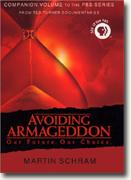Avoiding Armageddon
Martin Schram
book reviews:
· general fiction
· chick lit/romance
· sci-fi/fantasy
· graphic novels
· nonfiction
· audio books
· author interviews
· children's books @
curledupkids.com
· DVD reviews @
curledupdvd.com
newsletter
win books
buy online
links
home
for authors
& publishers
for reviewers

 |
Avoiding Armageddon: The Companion Book to the PBS Series Martin Schram Basic Books Hardcover 256 pages March 2003 |
|
Avoiding Armageddon is one of the scariest books Iíve read in a long time. A companion piece for the PBS series of the same name, this volume discusses the Cold War folly of presuming that weapons of mass destruction make the world safer. Aside from the intimidation factor, they appear to be expensive status symbols indicating which countries have joined the exclusive club of nuclear powers. In particular, the arms race between the United States and the Soviet Union in the second half of the twentieth century led to the acquisition of arsenals so lethal as to allow the two nations to utterly destroy each other. Fortunately, that never happened. In the early 1990s, decades of super-power animosity eased Ė but the weapons remained in moldering stock-piles.
In the former Soviet Union, the situation is even more perilous. As in the US, tons of nuclear, biological and chemical agents are scattered throughout the region. When the Soviet economy imploded, many scientists and engineers working with these materials lost their jobs. Without income, these people became vulnerable to offers from terrorists and governments interested in acquiring either technology or source materials. Martin Schram discusses this legacy of the Cold War in terms of three main issues. First, the likelihood of an accident brought about by local populations wandering through areas polluted by chemicals, disease or radiation will continue to be high as long as these stockpiles exist. Schram provides several examples of people exposed to nuclear wastes due to irresponsible disposal, leakage from old storage sites or criminal activity. These stories are interesting given the current reports from Iraq of looters stealing barrels previously used for storing yellowcake. Oblivious to the dangers, these folks were looking for something to use as a cistern. How extensively did they contaminate their homes with this stuff? How much did they compromise their health? Children find poisons seeping through the ground, old women store radiated tools under their beds. A small town in Georgia cringes in terror as the military incinerates warheads filled with deadly gases. Throughout the world, communities are dealing with the aftermath of wars that never took place. Secondly, Schram discusses the chance that countries possessing these awful weapons might use them. Aside from the United States, Britain and Russia, many other countries now have "the bomb." Traditional enemies India and Pakistan each have nuclear weapons. A war between them would have disastrous results on both parties and fallout would impact the surrounding region. However, nuclear technology is expensive. Its major goal is deterrence. Many other countries admit to owning chemical and biological weapons. Known as the poor manís nukes, they are cheaper and easier to hide. Country to country reprisals with gas or anthrax would wreak maximum damage for a small financial investment Ė thus allowing less wealthy nations to enter into the world of WMDs. Regimes with any of these agents must have a process in place on how and when they use them. As more governments acquire WMDs, the chances of circumvention rise. Eventually, someone will do it. Thirdly, Schram discusses the threat from terrorists who might acquire WMDs. In national conflicts, it is suicide to launch an attack on a country known to have "the bomb." It invites retaliation. However, terrorists donít live in a particular country. They are scattered throughout the world. A small amount of Sarin dropped in a crowded train in Japan killed a few people and terrified millions. A few grams of anthrax sent to government and media personalities through the mail were extremely successful from a terrorist point of view. Armies canít respond to such an attack. It takes police work to sort out who and how and where. Around the world, nuclear power plants and wastes, biological labs full of viruses and bacterium and barrels of chemicals are tempting targets for well-heeled organizations looking for ways to promote their agendas. Against this danger, defenses are few. Schramís book is a sorrowful read. Even so, I recommend it. How ironical that the very weapons we created for protection now threaten us in so many ways.
|
|
|
|
 Click here to learn more about this month's sponsor! |
|
| fiction · sf/f · comic books · nonfiction · audio newsletter · free book contest · buy books online review index · links · · authors & publishers reviewers |
|
| site by ELBO Computing Resources, Inc. | |
 In the United States, caches of aging chemical and biological weapons stashed around the country pose environmental and health threats to nearby communities. Storage facilities struggle with leaking containers, the costs of security and the threat of natural events like earthquakes. Even the process of destroying these munitions is technically problematic and politically controversial.
In the United States, caches of aging chemical and biological weapons stashed around the country pose environmental and health threats to nearby communities. Storage facilities struggle with leaking containers, the costs of security and the threat of natural events like earthquakes. Even the process of destroying these munitions is technically problematic and politically controversial.